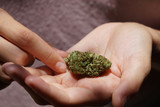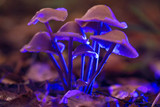2024 Cannabinoid Matchup: THCA vs. CBGA
THCA and CBGA are both raw precursor cannabinoids found in the cannabis plant. While they share several things in common based on their chemical properties, they’re also two extremely different cannabinoids in terms of how they affect us, both before and after they have been decarboxylated and converted into THC and CBG.
THCA and CBGA are unique from one other in a variety of ways, but you might be surprised by just how much they actually have in common with one another. And, that’s why it’s important to know the key differences between them, as one could be far more suitable for you than the other. Plus, lots of us have a specific purpose for taking a hemp-infused product, and one of these two cannabinoids might be a better capable of helping you reach your goals.
So, let’s compare them and help you figure out which of the two is more suited to your needs.
Contender #1: THCA (Tetrahydrocannabinolic Acid)
THCA, aka tetrahydrocannabinolic acid, is the raw, acidic cannabinoid found in raw cannabis, and it’s the precursor to THC (tetrahydrocannabinol). Because the cannabinoid has not yet been decarboxylated (heated to a specific temperature to convert THCA into delta 9 THC), its effects are totally different from THC. THCA only exists in raw cannabis, because once the cannabinoid has been heated through the process of decarboxylation, it converts into delta 9 THC and takes on new properties, including psychoactive effects. The hemp plant yields about 0.3% THCA, while in marijuana, it’s the dominant cannabinoid.
THCA is also legal under federal law (2018 Farm Bill), as the United States only bans products containing more than 0.3% delta 9 THC, and THCA, despite becoming delta 9 when heated, isn’t classified as delta 9. This means that even products like THCA flower and vapes are legal. But, there are 5 states that have banned products that contain more than 0.3% “total” THC – aka a combination of delta 9 and THCA.
What’s the High Like?
When it’s consumed as a raw cannabinoid, THCA does not have any psychoactive properties, and so it won’t get you high. That’s because raw cannabinoids do not interact with CB1 receptors that cause intoxication. But, products that must be decarboxylated to be consumed, like THCA vapes, dabs and flower, allow the THCA to chemically convert into delta 9 THC, which means you’re then consuming delta 9, and not THCA. So, these 3 types of THCA products are actually intoxicating.
What are THCA’s Non-Psychoactive Properties?
Like all raw cannabinoid precursors, THCA does not attach to CB1 and CB2 receptors, since that only occurs with post-decarboxylated cannabinoids. But, THCA is an antioxidant, and have the ability to regulate COX-1 and COX-2, two enzymes that impact the body’s inflammatory response. COX-1 and COX-2 are responsible for the release of prostaglandins, which cause the pain associated with inflammation.
THCA also plays a huge part in maintaining two proteins in the body known as TRPA1 and TRPV2, which are channels that enable our body’s endocannabinoids to do their jobs.
- TPRA1 regulate for pain, itching, tolerance to cold and sensitivity to irritants in the environment.
- TRPV2 is responsible for body temperature regulation.
Something else to know about THCA is that it’s shown to increase anandamide uptake. Anandamide is a cannabinoid produced within the body that has a powerful influence on mood regulation, as well as sleep.
Does THCA Have Benefits?
The research on THCA is still in its early stages, and many of the potential benefits we will be discussing are based on preliminary studies. Additional extensive clinical trials are needed to totally know the effects and potential therapeutic uses of THCA. So, with all that being said, here are several potential benefits:
- Anti-Inflammatory Properties: THCA has shown potential as an anti-inflammatory agent. This could be beneficial for conditions like arthritis and lupus.
- Neuroprotective Effects: Early studies indicate that THCA may have neuroprotective properties, which could be useful in treating neurodegenerative diseases like Parkinson's and Alzheimer's.
- Anti-Proliferative Effects: Some research suggests that THCA may inhibit the proliferation of cancer cells, though this area requires much more research before any firm conclusions can be drawn.
- Anti-Emetic Effects: THCA might help in reducing nausea and vomiting. This can be particularly beneficial for patients undergoing chemotherapy.
- Analgesic Properties: There's some evidence suggesting THCA might help in pain management, though it's not as strong as THC in this regard.
Does THCA Have Side Effects?
THCA itself is non-psychoactive, but it can have some potential side effects, though they are generally mild compared to THC. Some potential side effects of THCA include:
- Nausea
- Dizziness
- Dry Mouth
- Hunger/Munchies
- Drowsiness
Who Would Prefer THCA?
When left raw, THCA is not recreational, and used therapeutically. Like we said, it has anti-inflammatory properties, and can help with sleep and mood, while also being a potent antioxidant. But, when THCA is sold in product types like dabs, flower and vapes, it’s used because of the fact that the THCA will turn into delta 9 THC. So, a product like THCA flower is used recreationally, because it mimics cannabis.
Contender #2: CBGA
CBGA refers to the raw, acidic precursor to CBG, found in raw cannabis prior to decarboxylation. It’s actually the “mother cannabinoid,” meaning that before the plant matures, it contains CBGA, which eventually splits off and becomes the over 100 cannabinoids we know of today – including THCA, as well as CBDA.
CBGA is a legal cannabinoid under federal law because of the 2018 Farm Bill, and it’s not banned in any states.
What’s the High Like?
CBGA is not a psychoactive cannabinoid because it does not interact with CB1 receptors in a way that creates a high.
Does CBGA Have Any Benefits?
CBGA has not been studied very extensively, but interest in its potential has been growing recently, so we do actually have a good idea of what it’s capable of in terms of possible therapeutic uses.
- Anticonvulsant Properties: Studies show that CBGA can help regulate the neurological system, as a neuroprotectant that strengthens neurons and neural pathways. CBGA could act as yet another cannabinoid that plays a role in managing the symptoms of epilepsy, by reducing electrical activity between neural pathways.
- Cardiovascular Properties: CBGA may reduce oxidative stress that can have damaging effects on the cardiovascular system, leading to heart disease and similar ailments. This is very promising as heart disease is one of the most common killers in the world.
- Metabolism Regulation: Studies are exploring links between cannabinoids found in hemp and metabolism, and CBGA is showing a lot of promise in this area. CBGA may play a role in the maintenance of energy homeostasis and metabolism, and even work against metabolic dysfunction.
- Properties Relating to SARS-CoV-2: In January of 2022, a study was published that demonstrated that CBGA, along with CBDA, was able to prevent SARS-CoV-2 from entering the cells of the lungs and other organs. CBDA and CBGA attach to the virus’ spike protein to modify its external structure, which prevents it from making its way into the organs of the body where it can cause the virus to become much more lethal.
Does CBGA Have Side Effects?
CBGA’s side effects are very mild and are not as strong compared to psychoactive cannabinoids. Still, there are some potential side effects that you might encounter such as:
- Dry Mouth
- Dizziness
- Low Blood Pressure
- Gastrointestinal Issues
Who Would Prefer CBGA?
CBGA, being nonintoxicating, isn’t used recreationally. But, you can see that it does come with lots of potential benefits. Right now, it’s used mostly because of its association with COVID, thanks to the study done in 2022 that showed its potential role in preventing the virus from entering organ tissue.
The Winner Is…
Both THCA and CBGA are raw cannabinoids that can be extremely useful with their potential benefits. But, one of the two becomes psychoactive once it’s heated, so there’s a whole other reason for exploring THCA outside of its inherent properties when raw. Still, we recommend trying THCA products and CBGA products available at The Calm Leaf, as both can give you lots of positive effects in your daily life. Not to mention, we only carry lab-tested, highly effective products from the leading brands in our industry today.
Recent Posts
-
Everything You Need to Know About THCA Flower in 2026
Navigating the botanical landscape of 2026 requires a keen eye for detail and an appreciation for th …Feb 08, 2026 -
The Next Psychoactive Combination: Live Resin & Mushroom Blends
Standing on the precipice of a brand-new era in botanical exploration, the modern enthusiast is witn …Feb 06, 2026 -
7 Mistakes to Avoid When Using Amanita Muscaria Powder
The forest floor has always held secrets that captivate the human imagination, but few natural speci …Feb 04, 2026


